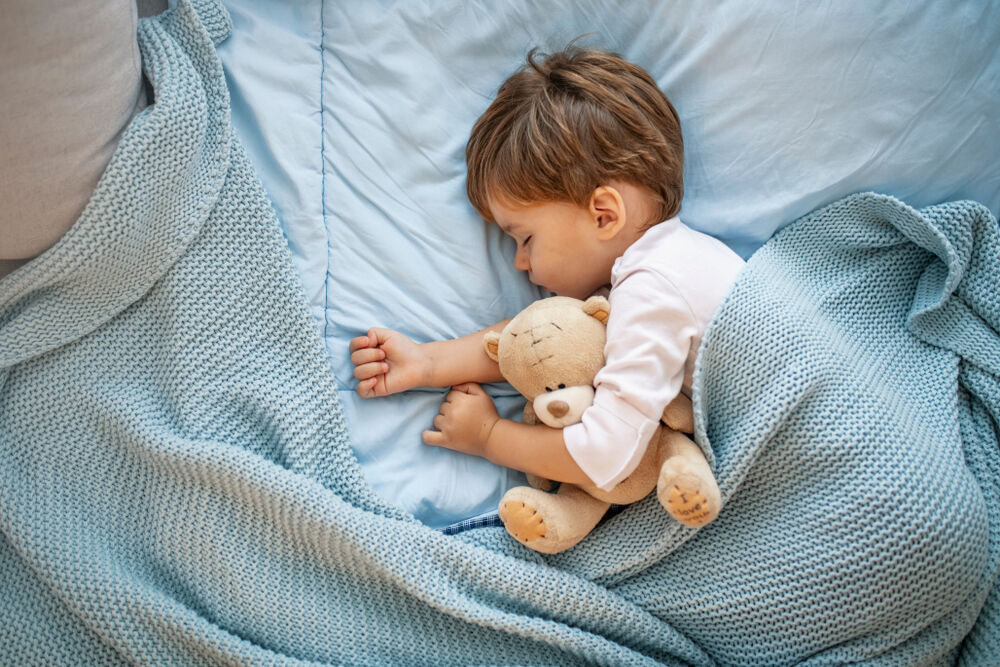Let's face it; parenting isn’t a walk in the park. While juggling the million things on our plates, ensuring our child gets quality sleep often slips through the cracks. But did you know that children’s sleep is as crucial as the food they eat or the air they breathe? Yep, a night of sound sleep does wonders for a child's overall health and development.
Importance of Sleep for Children's Development
Sleep isn't just a passive activity or downtime for kids; it's when some of the most active internal work happens. During those quiet hours of rest, children's bodies and brains are bustling, processing the day, making connections, and undergoing physical growth. Understanding the multifaceted benefits of sleep can help us appreciate why a restful night is paramount for a child's holistic development.
Physical Growth
Children grow overnight, literally. The growth hormone is secreted during deep sleep, aiding in muscle development and bone growth. If you've ever noticed your child seems taller after a night's sleep, you're not just imagining it!
Cognitive Development
Sleep is the prime time for the brain to form new connections, enhance memory, and improve concentration. So when we talk about the school of sleep, it's a real thing. Without proper rest, learning abilities can take a hit.
Emotional Well-being
Ever dealt with a cranky, sleep-deprived toddler? Insufficient sleep can lead to mood swings, irritability, and even depression in older kids. On the flip side, adequate sleep helps in better emotional regulation.
Immune System Strengthening
A sound sleep amps up the body's defense mechanism. So, the age-old adage "sleep it off" when kids feel under the weather holds water.
Understanding Children's Sleep Patterns
Every child is unique, and so are their sleep patterns. However, there's a science to understanding the rhythm and requirements of how children sleep at various stages of their growth. As kids age, their sleep needs and cycles evolve, differing significantly from that of adults. Recognizing these patterns isn't merely about ensuring they get sufficient sleep; it's about aligning with their natural biological rhythms to promote overall well-being.
Sleep Needs by Age
Children's sleep requirements aren't one-size-fits-all. Newborns, toddlers, school-age children, and teenagers all have different sleep requirements. While a baby might need up to 17 hours a day, a teenager will function optimally on 8-10 hours.[1]
Differences Between Adults and Children's Sleep Cycles
Children tend to spend more time in the deep stages of sleep. That's why they can sleep through thunderstorms, while adults might be tossing and turning. Unlike the latter, the former spends more time in the rapid eye movement (REM) phase of sleep, which is essential for brain development. Their sleep cycles are shorter, and they transition between phases differently than adults.[2]
Common Sleep Disorders in Children
Childhood is often seen as a time of carefree days and restful nights, but the reality is that kids aren't immune to sleep disruptions. They can experience a range of sleep disorders, some unique to their age group, that can affect their daily functioning, mood, and overall health. Recognizing these disorders early and seeking the right intervention can make all the difference.
Insomnia
Often thought to be an adult sleep problem, children can indeed suffer from insomnia, finding it difficult to fall asleep or stay asleep throughout the night. It's important to note that this can be due to anxiety, certain medications, or even poor sleep habits developed over time.
Sleepwalking
It's not just the stuff of movies; sleepwalking is a real phenomenon, particularly among children. They might appear to be awake as they move around, but they're actually in a state of deep sleep and will have no memory of the event. Sleepwalking episodes can be triggered by factors such as sleep deprivation or fever.[3]
Nightmares and night terrors
Every child has the occasional bad dream, but consistent nightmares can disrupt their sleep quality. Moreover, night terrors, which are intense episodes of fear during deep sleep, can be particularly distressing. Night terrors differ from nightmares as children usually don't recall them, but they can be alarming for parents to witness.
Sleep apnea
Sleep apnea is characterized by pauses in breathing or shallow breaths while sleeping. In children, it can often be linked to enlarged tonsils or adenoids. Left untreated, sleep apnea can lead to behavioral issues, growth problems, and even heart strain.[4]
Establishing Healthy Sleep Routines
A solid foundation of good sleep habits doesn't just happen overnight. It requires conscious effort, understanding, and patience from caregivers. Establishing a sleep routine early in a child's life not only benefits their physical health and emotional well-being but also sets the stage for consistent sleep patterns into adulthood. As they say, "Good habits are best cultivated young."
Bedtime rituals
Consistency is key when it comes to bedtime. Rituals such as reading a book, taking a warm bath, or playing calming music can signal to a child that it's time to wind down and prepare for sleep. Over time, these rituals become familiar, giving children a sense of security and predictability each night.
The role of a sleep environment
A comfortable, dark, and quiet room can make all the difference. It's essential to ensure that the bedroom is conducive to sleep, free from distractions like loud noises or bright lights. Also, investing in a quality mattress and pillow, like those offered by Mancini's Sleepworld, can enhance the comfort level, promoting deeper, uninterrupted sleep.
Importance of consistency
Sticking to a regular sleep schedule, even on weekends, helps regulate a child's internal body clock. Consistently maintaining a bedtime routine aids in establishing a rhythm, making it easier for them to fall asleep and wake up at the same time every day. It's like training their biological clock for punctuality.
Addressing sleep disruptions
Occasional disruptions, like waking up from a bad dream, are normal. However, if your child consistently faces difficulties, it's essential to address the root causes, whether it's anxiety, a disruptive sleep environment, or an underlying sleep disorder. Early intervention can prevent these disruptions from becoming chronic issues.
Sleep Tips for Parents
A child's bedtime routine doesn't solely rely on them; it's significantly influenced by the environment and habits cultivated at home. As role models, parents play a vital role in shaping their children's sleep behaviors.
Leading by example
Children often mirror the behaviors they observe. If they see you prioritizing sleep and maintaining a consistent bedtime, they're more likely to do the same. Emphasizing the importance of rest and showcasing a balanced sleep routine can speak volumes more than just verbal instructions.
Addressing fears or concerns
Nighttime can be a source of anxiety for some children. Whether it's fear of the dark, nightmares, or bedtime separation anxiety, it's crucial to address these concerns with compassion and understanding. By creating a safe space for communication, you reassure your child that their feelings are valid and help them navigate their worries.
Incorporating physical activity during the day
Active play and physical exercise during the day can significantly improve sleep quality. Not only does it expend energy, but it also aids in regulating sleep-wake cycles. However, it's essential to avoid vigorous activities close to bedtime, as it can have the opposite effect and make winding down more challenging.
Monitoring screen time before bed
The blue light emitted from screens can interfere with the production of the sleep hormone melatonin. Reducing screen time at least an hour before bed can help in setting the tone for a restful night. Instead, consider engaging in low-energy activities like reading or puzzles, which can be both educational and sleep-friendly.
Discover the Best Mattresses and Other Sleep Accessories for Children and the Whole Family
Every child deserves quality sleep, and where they sleep plays a pivotal role in that. At Mancini's Sleepworld, we're not just selling mattresses; we're offering a promise of sound sleep. With over 50 years of experience, our commitment to quality and customer service is unparalleled.
Whether it's our Perfect Match Guarantee, the 120 Night Comfort Guarantee, or our professional setup, every service is designed keeping you in mind. Don't just take our word for it; visit our website and browse through a range of mattresses tailor-made for your child's primary care and comfort. Remember, a good mattress isn't just a purchase; it’s an investment in your child's health and future.
And while you're there, don't forget to check out our exclusive range of sleep accessories, ensuring the entire family, from the toddlers to the teens and the adults, get the rest they deserve. Visit Mancini’s Sleepworld and embark on your journey to perfect sleep today! Because, after all, we believe everyone, irrespective of age, deserves to wake up feeling their absolute best.
References:
1. About sleep | Raising Children Network 2023. https://raisingchildren.net.au/newborns/sleep/understanding-sleep/about-sleep
2. How Kid Sleep Is Different from Adult Sleep | Happiest Baby 2023. https://www.happiestbaby.com/blogs/toddler/how-kid-sleep-is-different-from-adult-sleep
3. Sleepwalking By NHS | NHS 2023. https://www.nhs.uk/conditions/sleepwalking/
4. Childhood Sleep Apnea, Pediatric Obstructive Sleep Apnea (OSA) | Cleveland Clinic 2023. https://my.clevelandclinic.org/health/diseases/14312-obstructive-sleep-apnea-in-children

